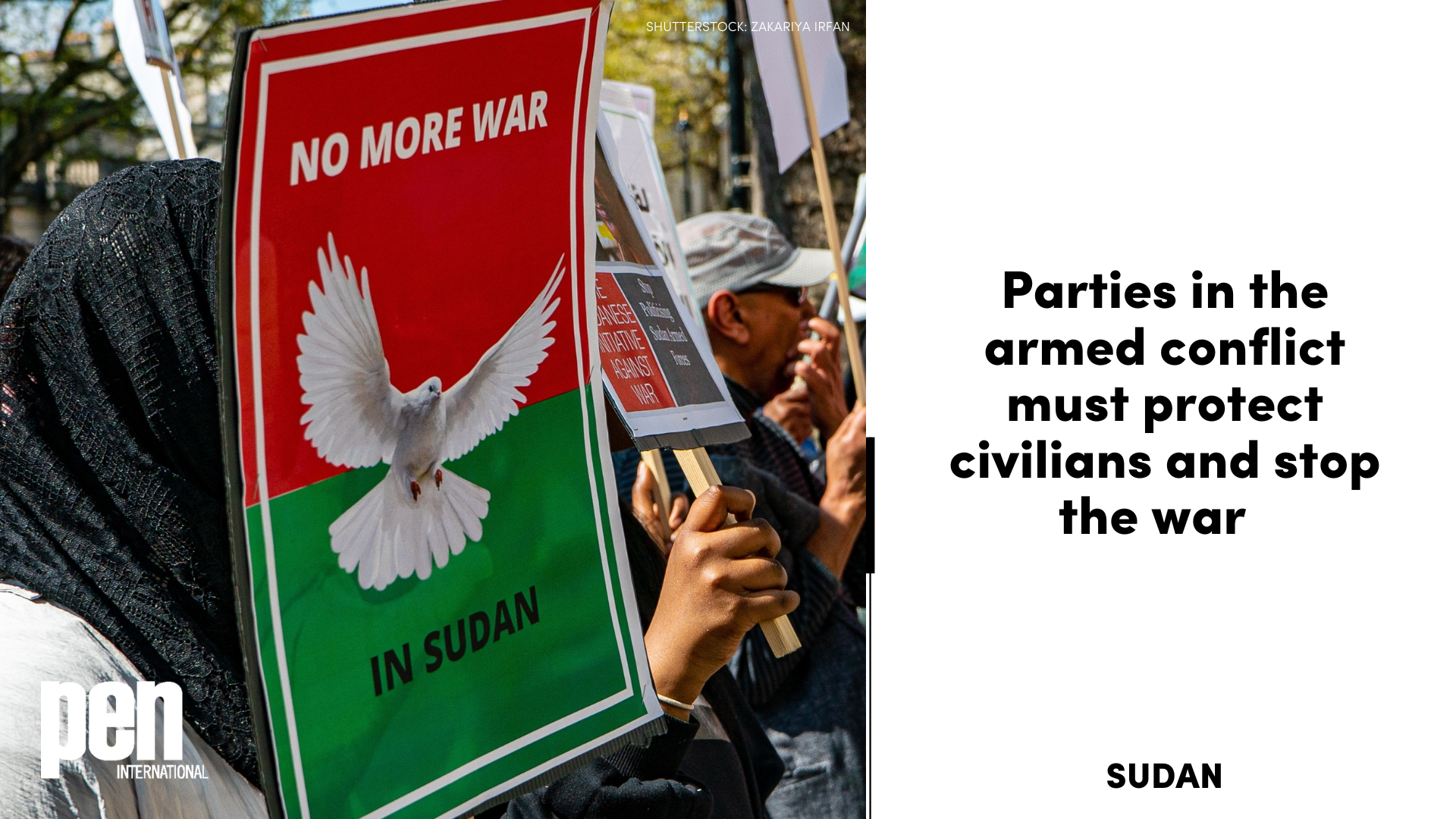Sudan: Parties in the armed conflict must protect civilians and stop the war
17 May: PEN International calls upon all parties to the conflict in Sudan to immediately end all hostilities, refrain from targeting civilian populations and infrastructure, ensure safe access to urgent humanitarian aid, and resume negotiations toward a peaceful resolution. We stress that a sustainable resolution of the power struggle between the Sudan Armed Forces (SAF) and the Rapid Support Forces (RSF) can only be achieved through a comprehensive framework for the resumption and completion of Sudan’s transition to civilian and democratic governance, which was dashed by the joint SAF and RSF coup in 2021.
While welcoming the SAF and RSF’s commitment to the Jeddah Declaration, upholding international human rights and humanitarian law, and ensuring that civilians are protected at all times, we are gravely concerned by reports of widespread human rights violations by both SAF and RSF forces. Hundreds of civilians have been killed, and hundreds of thousands forcibly displaced as shelling and bombardment of civilian infrastructure, including homes, schools, hospitals, media offices, and commercial centres, has been recorded.
Throughout the conflict, SAF and RSF fighters have persistently targeted unarmed civilians in what PEN International believes could amount to war crimes and crimes against humanity. According to the International Organization for Migration (IOM) and UNHCR, an estimated 1 million people have been newly displaced, with at least 736,200 displaced internally and about 200,000 fleeing to neighbouring countries. Based on UN estimates, at least 750 people have been killed in the conflict and , and 5,000 others were injured. Despite consecutive ceasefire agreements and the latest Jeddah Declaration, both SAF and RSF have violated their commitments and resumed hostilities.
The Sudanese Journalists Syndicate has reported that local and international journalists have been subjected to threats, intimidation and physical attacks to prevent them from reporting about the conflict. Furthermore, human rights defenders, including women’s human rights defenders, have been subject to harassment and intimidation in calculated attempts to impede their ability to monitor, document and report on the situation. The conflicting parties have also been accused of committing serious human rights abuses, including looting, extrajudicial killings, enforced disappearances, sexual and gender-based violence and rape.
“Attacks on journalists and human rights defenders by the warring parties are a clear scheme to impose a blackout on the atrocities they commit. The work of journalists and human rights defenders must be respected and protected, especially in times of war. What we are witnessing in Sudan is a systematic violation of Sudan’s international human rights obligations. Both parties to the conflict must strictly uphold international humanitarian and human rights laws and protect civilians, including journalists, humanitarian workers and human rights defenders”, said Germán Rojas, Chair of PEN International’s Writers for Peace Committee.
While calling on the SAF and RSF to take urgent action to end the senseless conflict and suffering of the people of Sudan, PEN International is mindful of both parties' notorious history of serious violations of international human rights and humanitarian law. We, therefore, support the UN Human Rights Council Resolution S-36/1 adopted on 11 May 2023, calling for a detailed human rights monitoring of the situation in Sudan and documentation of all alleged human rights violations since the military coup of 25 October 2021 and those arising directly from the current conflict.
We call on all actors seeking an end to the fighting in Sudan, particularly the African Union (AU), the regional Intergovernmental Authority on Development (IGAD), United Nations agencies and mediating foreign governments to act in unison to ensure an immediate cessation of all hostilities, and a sustainable, peaceful and just resolution for millions of Sudanese who have suffered violence, human rights abuses and violations, displacement and uncertainty over decades of military dictatorship.
Background
The ongoing armed conflict in Sudan that erupted between the Sudan Armed Forces (SAF) and the paramilitary Rapid Support Forces (RSF) is a culmination of decades of unchecked excesses of military rule - a period characterised by systemic disregard for the rule of law and human rights abuses, suppression of dissenting voices through imprisonment, assassination and enforced exile; clampdowns of the independent press, personalised rule, authoritarianism and corruption.
In 2019, long-time military ruler, Omer al-Bashir, indicted by the International Criminal Court (ICC) for war crimes and crimes against humanity, was removed from power in a popular uprising. At the height of his power and influence, al-Bashir worked closely with both General Abdel Fattah al Burhan within the national armed forces context; and Mohamed Hamdan Dagalo, popularly known as Hemedti as Commander of the RSF. RSF was established in 2013 as a separate fighting force for al-Bashir.
RSF evolved from the feared Janjaweed militia, which al-Bashir’s government deployed in brutal counter-insurgency operations to quell a rebellion in the Darfur region in the 2000s. In the Darfur conflict, an estimated 2.5 million people were displaced and 300,000 killed. The crimes of the Sudanese government and the militia group led to the ICC indictments of government officials, including President al-Bashir and Janjaweed commanders of genocide, war crimes and crimes against humanity.
Despite their role in the violent crackdown on pro-democracy protestors during the uprising, RSF eventually joined the top leadership of SAF to oust President al-Bashir in April 2019. In August of the same year, under relentless pressure from protestors demanding a civilian-led transition, the junta agreed to form a joint military-civilian transition council, in which al-Burhan is the Chairperson, Dagalo the Vice- Chairperson, and Abdalla Hamdok, a civilian was appointed Prime Minister. The two military commanders ousted Hamdok in a military coup in October 2021. At the centre of the ongoing armed conflict in Sudan is a power struggle between the two military generals.
For further information, please contact Nduko o’Matigere, Head of Africa Region at PEN International, on email [email protected]

